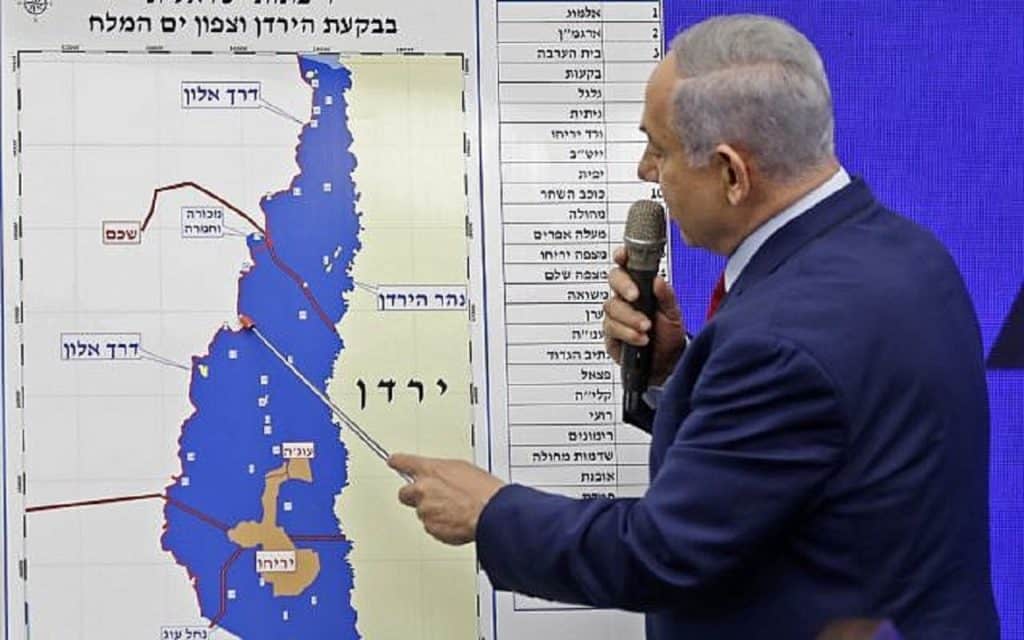By Smriti Lohia
In May 2020, Israel proposed an “annexation plan”, confiscating significant portion of the West Bank, preceded by the announcement of “peace plan” by the Trump administration which profoundly laid the foundation for Israel to take the decision unilaterally to annex and declare sovereignty over parts of Occupied Palestinian Territory (OPT) in the West Bank.

Annexation is a term which is extensively forbidden by International law. The annexation of occupied territory is a grave violation of International law, under the Charter of the United Nations and the Geneva Conventions. Israel’s vigorous conduct in and around of the OPT has already committed human rights violations against Palestinians on multiple fronts, such as the confiscation of natural resources, home demolitions, labor exploitation, the detention of children, lack of freedom of movement, expansion of illegal settlements and so on. Correspondingly, Israel has violated several international laws, as for instance, Article 2(4) of the UN Charter, which prohibits acquiring land by force; Article 1 of the UN Charter, which promotes respect for human rights irrespective of race, sex, language, or religion; Article 49 of the Geneva Convention, which prohibits individual or mass forcible transfers.
The US, specifically in Trump administration, holds pro-Israel stance firmly, like never before. Paradigmatically, the US did not always support Israel. It is during Cold war when the US-Israel relations commenced, majorly because Israel was the only democratic country in the Middle East region. So, to remain relevant in the region, the US used Israel to congeal its foothold in the region. Among Americans, earlier Israel was seen as an anti-communist, and now as a country which needs support and protection from its hostile neighbors.
Furthermore, the locus of the US’s interest towards Israel is still the same, to stand as a bulwark against Israel’s foes in the region. The reason might not change in the not-so-distant future as well. Recent developments in the Middle East region, such as Israel-UAE deal and Israel-Bahrain deal, might brand Trump, the master negotiator, but his transactional approach says the otherwise. For instance, withdrawing the US troops from the region, such as Syria, might not hold the alliances together for too long which can further affect the US and its allies’ security. Nevertheless, these deals could be conducive situation for the US and Israel. For Benjamin Netanyahu, this could be an escape from the international criticism, based on the diverse violations Israel is committing in contemplation of national security whereas for Donald Trump, this might be a leeway to have the whip hand in upcoming the US Presidential elections 2020.
The rapprochement between Russia and Israel has been thawing lately. The foundation of this well-disposed show not only hinges on economic terms, but also on political and diplomatic terms. Recently, the release of Naama Issachar, in January 2020, was one of its symptoms. From Russia’s outlook, it is like walking on a complicated tightrope. Russia might not be seen as playing in forefront but definitely it has been playing unilaterally. Both, Russia and Israel have common concern in the region that is Syria. Instead of sitting back passively, the two might try mitigating the concerned issue and, sooner or later, might bring the matter to the negotiating table.
The blooming commercial relations between China and Israel give a lot of anxiety to the US. China is investing billions of dollars in Israel. Though Trump is sceptical about this multifaceted economic partnership, claiming that commerce with China poses a security threat. However, Israel sees this as a significantly opportunistic recourse. Beijing’s outreach to Israel has notably increased the bilateral trade, from Belt and Road Initiative (BRI) to securing operational ownership of the ports. China is purely practicing economic statecraft to pursue its international interests.
To conclude, if annexation plan succeeds then human rights violations would intensify and will eventually add up to the heightened tensions and several other unlawful occurrences. As per the Articles 40-41 of the Articles on the Responsibility of States for Internationally Wrongful Acts (ARSIWA), third states must withhold the recognition of Israel’s conduct aiming at annexing parts of the West Bank as well as refrain from granting aid and assistance in maintaining such conduct. They must cooperate to pull the plug on the unjust and unlawful situations.
Nevertheless, while observing the contemporary relations between Israel and major powers, who are among the five permanent members of the UNSC, Israel might escape again from International law. With the constant support from the US, Israel has always been given the benefit of doubt, and with Russia and China coming into the larger picture will amplify Israel’s position in infringing the international code of conducts. However, the International community, such as human rights defenders and civil society organizations, might work as a resistance tool and could open the Pandora’s Box of systematic human rights violations.
Author: Smriti Lohia (Pursuing Masters in International Relations. New Delhi, India)
(The views expressed in this article belong only to the author and do not necessarily reflect the editorial policy or views of World Geostrategic Insights).
Image Credit: Menahem Kahana/AFP







